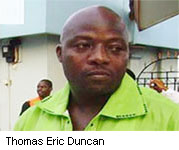
WEDNESDAY, Oct. 8, 2014 (HealthDay News) — The Dallas Ebola patient died Wednesday morning at Texas Health Presbyterian Hospital, hospital officials said.
Thomas Eric Duncan, a Liberian national, had entered the United States on Sept. 19, apparently healthy and without any Ebola symptoms. He first developed symptoms Sept. 24 and sought care two days later at Texas Health Presbyterian Hospital, but was released from the hospital. He was taken back to the hospital on Sept. 28 after his condition worsened.
Duncan, 42 years old, had been undergoing aggressive treatment, as well as ventilation and kidney dialysis.
He was the first person to be diagnosed with Ebola in the United States. The often fatal disease has been sweeping through three West African nations since the spring.
No one who came into contact with Duncan after he arrived in Dallas from Liberia last month has come down with a fever or any other symptoms of Ebola, Dr. Tom Frieden, director of the U.S. Centers for Disease Control and Prevention, said at a Tuesday afternoon news briefing.
Public health workers are monitoring 10 people confirmed to have contact with Duncan after he fell ill with Ebola and became contagious, as well as 38 other suspected contacts. The 10 include several members of Duncan’s family living in Dallas and the ambulance crew that transported him to the hospital, officials said.
Meanwhile, the American medical missionary who was successfully treated for Ebola at an Atlanta hospital has donated blood to the latest American to be flown back to the United States for treatment of the disease.
Dr. Kent Brantly, who became infected while treating patients in Ebola-ravaged West Africa, has donated blood to Ashoka Mukpo, a freelance TV cameraman who’s undergoing treatment at the Nebraska Medical Center in Omaha.
The hope is that Ebola antibodies in Brantly’s blood will help Mukpo recover from the virulent viral infection. Brantly received a blood donation from an Ebola survivor while in West Africa before undergoing rigorous drug and medical treatment at Emory University Hospital in Atlanta last month.
Brantly made a similar blood donation to a fellow medical missionary and friend, Dr. Rick Sacra, who was successfully treated for Ebola at Nebraska Medical Center and released last month.
In what Nebraska Medical Center officials are calling “an amazing stroke of luck,” Brantly — the first American to return to the United States for treatment for Ebola — was traveling in the Nebraska area when he was asked to donate blood to Mukpo. Mukpo was scheduled to receive the blood on Wednesday.
“It’s not a likely scenario that he would again have the same blood type,” Dr. Angela Hewlett, associate medical director of the Omaha medical center’s Biocontainment Unit, said in a center news release. “We are incredibly grateful that Dr. Brantly would take the time to do this, not once, but twice.”
Doctors can’t say for sure whether blood donations from Ebola survivors can help with a cure because the handful of Ebola patients treated in the United States have also received aggressive drug therapy and sophisticated medical care.
In related matters, CDC officials are working to develop advanced screening procedures for people entering the United States from the West African nations affected by the Ebola epidemic: Liberia, Guinea and Sierra Leone, Frieden said.
President Barack Obama ordered additional screening measures after meeting with top security and health advisers on Monday.
Frieden did not provide specifics, but said the CDC can track people entering the United States from those nations even if they take an indirect flight, by working with customs and border control officials.
Screening methods for travelers could include a fever check and a detailed questionnaire to cover their potential exposure to Ebola, Frieden said.
Officials also addressed Monday’s revelation that a nursing assistant in Spain had become the first person known to catch Ebola outside of West Africa. She was part of a medical team that treated a 69-year-old Spanish priest who died in a Madrid hospital last month after being flown back from Sierra Leone.
Spanish health officials have quarantined several people at the hospital where the woman became infected and have decided to euthanize her dog, according to published reports.
The woman told her doctors she remembered touching her face with protective gloves while treating the priest. Spanish health officials were investigating Wednesday whether that contact with the face could have led to the woman’s infection.
The Ebola epidemic in West Africa is the worst outbreak ever of the disease. So far, an estimated 7,500 people have become infected and an estimated 3,440 people have died in Guinea, Liberia and Sierra Leone, according to the World Health Organization.
More information
For more on Ebola, visit the U.S. Centers for Disease Control and Prevention.
Copyright © 2024 HealthDay. All rights reserved.

